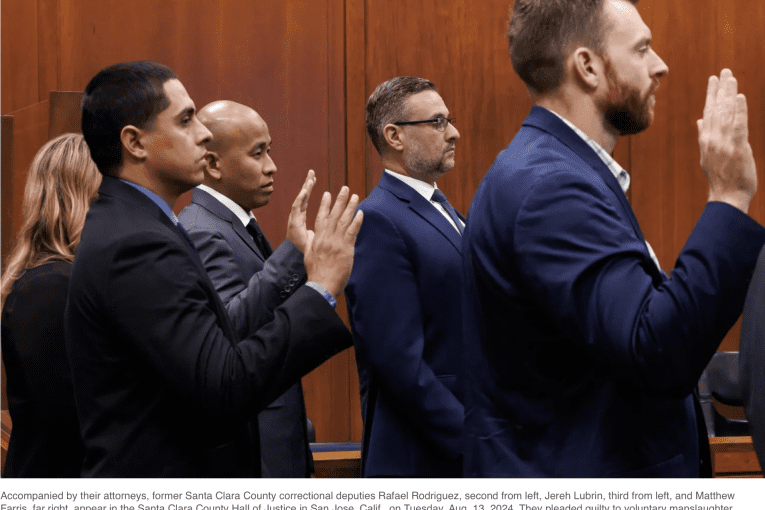
SAN JOSE, CA — Three former Santa Clara County jail guards will soon be freed after the 2015 beating of the incarcerated Michael Tyree, two years following the overturning of their murder convictions—the three jail guards pleaded guilty to lesser charges to avoid a second trial, according to The Mercury News.
Wrote The Mercury News, on Aug. 26, 2015, the 31-year-old Tyree was being held in the county Main Jail in San Jose. While waiting for a bed to open up at a residential treatment center, authorities claimed Jereh Lubrin, 37; Matthew Farris, 36; and Rafael Rodriguez, 35, beat Tyree in his cell using batons, fists and kicks.
Tyree ended up with severe injuries including trauma to his spleen, small bowel, liver, face, skull and the front and back sides of his body.
In 2017, the three jail guards were convicted of second-degree murder. Jurors rejected the defense argument that injuries were due to an accidental fall or suicide. The three guards were sentenced to 15 years to life in prison.
During the two-month trial, prosecutors presented text messages from the deputies, majority of which were sent from Farris. They mentioned incarcerated individuals being “twisted up,” “sprayed,” “kicked,” “locked down,” “slapped” and “beaten the (censored) down.”
Other testimony said, according to The Mercury News, Lubrin had casually said that “beating people up is part of my job at the jail.” The prosecution cited a web search by Rodriguez titled, “Can you die if someone punches you in the armpit?” the day after Tyree died.
At a San Jose courtroom this past Aug. 13, the three officers voluntarily entered new manslaughter pleas, which have a maximum prison term of 11 years. They will likely be paroled within the next few months for time served.
The source added that the pleas were entered in the room next to the main jail, which is where the crime scene was. The three guards have been on home detention for the past month and will be formally sentenced in October.
In 2022, the appellate court overturned the initial second-degree murder convictions due to a legislative change that invalidated legal directions given to jurors while deciding the original 2017 verdict, reported The Mercury News.
The following year, the California Supreme Court upheld the court’s ruling. The District Attorney’s office was left to decide whether to re-file the original murder convictions, seek different convictions, reach a plea agreement, or dismiss the case entirely.
The three men were required to admit in Judge Benjamin Williams’ court that they either assaulted Tyree or aided and abetted the deadly attack on the incarcerated individual. When Deputy District Attorney Matt Braker asked them to affirm that they participated in the assault and that they acted with “conscious disregard for human life,” they answered in confirmation, said The Mercury News.
As a result of the defendants’ admission, the door for future appeals has been closed. District Attorney Jeff Rosen said the resolution was the outcome of a proposal from the defendants. Rosen said the agreement discerned that the prison time served by the three jail guards would not be noticeably affected. The three guards are likely to receive parole at the end of this year.
Rosen included, wrote The Mercury News, “We accepted that disposition, the defendants pleaded guilty, and the cases concluded. We brought some finality, some measure of justice to Michael Tyree’s family, as well as our entire community. It was important for us to have them say what they did, and what they did is beat this mentally ill man to death, and that it was an awful, awful crime.”
He included that the defendants’ admissions were important to his office in ultimately closing the case.
The Mercury News said Tyree’s death was a major event in the direction of increased civilian auditing of county jails. The case inspired the establishment of county-run civilian oversight of the jails. Additionally, it also led to conflict over the watchdog’s access to sheriff records and the sheriff handling of mistreatment cases regarding incarcerated individuals.
The conflict rolled over into a civil grand jury corruption trial that resulted in the retirement, resignation, and official expulsion of longtime Sheriff Laurie Smith.
A year following the convictions, the state Legislature passed Senate Bill 1437, which amended state law to eliminate the legal argument known as “natural and probable consequences.” Previously, jurors had been allowed to cite the theory in finding a defendant guilty of murder, regardless if the person may not have directly killed anyone, but on the proposition that a victim’s death was an uncontrollable and inevitable consequence of the defendant’s actions, The Mercury News reported.
One of SB 1437’s objectives was to alleviate murder convictions for people who had exterior involvement in a crime, but were being punished to the same degree as someone who committed undeniable deadly violence.
Ultimately, a three-judge panel, said The Mercury News, from the Fourth District Court of Appeal in Division Three overturned the deputies’ murder convictions after discovering that trial jurors were told, in alignment with previous law, that they could consider “natural and probable consequences” before arriving at their decision.The Mercury News added the Fourth District panel’s ruling did recognize that murder convictions might still be secured against Lubrin, Farris and Rodriguez. However, if so, they would be applied based on “implied malice” theory, which argues that the deputies knew that their actions could lead to deadly consequences, but proceeded anyway.